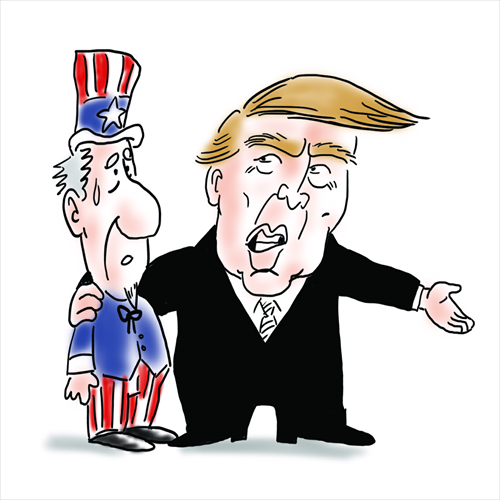Trump’s rise stems from US popular anger

Illustration: Shen Lan /GT
As the earlier polls have showed, Republican Donald Trump and Democrat Hillary Clinton have both racked up big wins in Super Tuesday last week and taken a vital step forward toward their party's nomination. For Republican moguls and fundraisers, there might be very little chance to stop Trump from being nominated from now on.
Within a couple of months, whether Trump will secure his nomination, and by November whether the US will present us with "President Trump," will be unveiled. What's worth noticing more is the phenomenon that Trump represents, as well as the changes and challenges that US politics is facing.
Trump is not the only strange candidate in the primary elections. In the GOP field, Ted Cruz, representative of the Tea Party, is currently in second place, while the mainstream Republicans, including mild Jeb Bush and conservative Marco Rubio, are gradually being marginalized.
In the Democratic Party on the other hand, Bernie Sanders, who calls himself a democratic socialist, has long been active in US politics as a semi-independent.
People often use the word "polarization" to describe US politics. The two parties on the left and right side of the US political spectrum, the Democratic Party and the GOP, are increasingly heading to extremes.
Nevertheless, the primary elections in 2016 are obviously not polarized. Some of Trump's ideas are very different from GOP tradition. The rise of Trump as well as Cruz and Sanders stems from not so much the emergence of populism as the rise of voters' anger.
In the states of Virginia, Georgia, and Alabama, over half of Republicans said that they feel "abandoned" by their country. The angrier they are, the more likely they will be to vote for Trump.
Statistically, the US has long walked away from the economic crisis. But the emergence of such a growing number of angry voters has mirrored some real problems in US society, namely a widening gap between the rich and poor, the shrinking of the middle class, stagnant family incomes, and lack of social mobility. In 1992, Bill Clinton said that "It's the economy, stupid." during his presidential campaign against George H. W. Bush.
Yet 24 years later, many US puzzles have emerge not because of the economy, but from politics and society.
Capital's pursuit of profits has led to increasing wealth inequality all over the world, and the US is no exception. Confronting the scattering and shift of power and influence, ordinary US people are losing their sense of superiority and security. Therefore, some have no more patience and decided to turn to extreme choices.
Whether US voters will eventually give up Trump and choose a "mature" candidate, or whether Trump will become "mature" along with the election or even after entering the White House, these questions have posed a serious challenge to the maturity of the US political system.
So far, Trump has "kidnapped" the GOP, which is not an unexpected outcome of the loose US political party system.
Many of the primaries are open to any resident, and others to any registered Republican. The system has made an untypical and unwelcomed candidate take the lead in the primaries, and many high-level Republicans have already raised concerns over the "spirit" of their party.
Beyond the phenomenon of Trump, we can see a huge flow of risks in US politics and society. Whether the nation will successfully deal with the challenges, changes and transitions will have far-reaching influence on its future. This is more interesting than how far Trump will go.
The author is director of the Institute of American Studies, China Institutes of Contemporary International Relations. opinion@globaltimes.com.cn